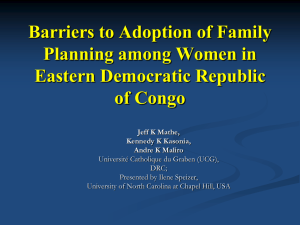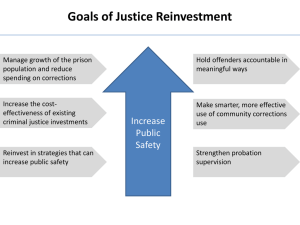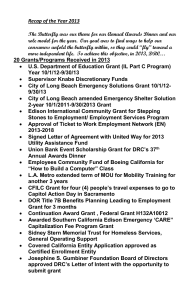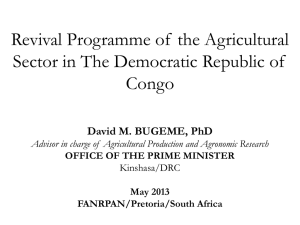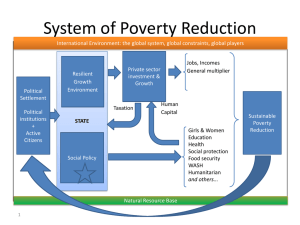(DRC)? - CIT International Conference
advertisement
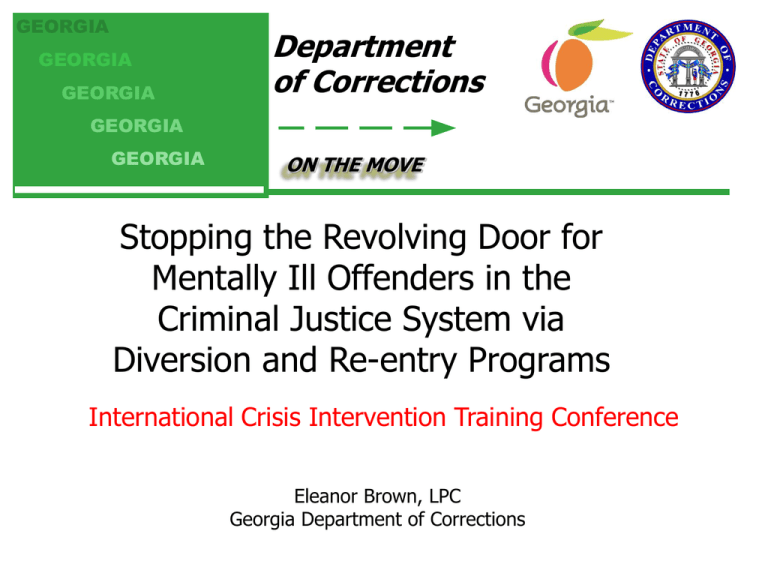
GEORGIA GEORGIA GEORGIA Department of Corrections GEORGIA GEORGIA ON THE MOVE Stopping the Revolving Door for Mentally Ill Offenders in the Criminal Justice System via Diversion and Re-entry Programs International Crisis Intervention Training Conference Eleanor Brown, LPC Georgia Department of Corrections Georgia Department of Corrections Statistics Nationally, 1 in 31 adults is under some form of correctional supervision. Georgia ranks 1st in the nation with 1 in 13 under some form of correctional control. Georgia ranks 4th in the nation with an adult incarceration rate of 1 in 70. GDC currently has approximately 160,000 convicted felons under probation supervision. Approximately 56,000 inmates in GDC prisons. Approximately 9,000 are classified as having a mental illness (15.4%). 27% of Day Reporting Centers Participants are classified as mentally ill. Justice Center Report “ A Guide to Research-informed Policy Practice” Increasing high numbers of people with mental illnesses are coming in contact with law enforcement agencies, courts and correctional agencies. Offenders with mental illnesses have a greater chance of recidivating than the general population offender. People with mental illness are at an increased risk of developing substance use disorders over the course of their life. Nearly a third of people who experience homelessness have a serious mental illness and their homelessness makes them highly visible to law enforcement. People with mental illnesses tend to stay in jail and prison longer and are less likely approved for parole than others charged with similar offenses. 72% of offenders with mental illness have a co-occurring substance abuse disorder. Justice Center Report “ A Guide to Research-informed Policy Practice” Best practices which are evidenced based in the delivery of mental health services for the mentally ill under community corrections supervision: Assertive Community Treatment utilizing a multidisciplinary team of professionals. Illness Self management and recovery, in which people learn skills to monitor and control their well-being. Integrated mental health and substance abuse services. Supported employment, in which people with mental illness are employed in competitive, integrated work setting with follow-along supports. Psychopharmacology-medications are used to treat mental illness. Family and consumer education, people with mental illness(es) and their families learn about mental illness, symptom management techniques and stress reduction. The Revolving Door for the Mentally Ill Homeless Prison Hospital Homeless Jail Probation Inmate Cost for GDC • It costs GDC $67 a day to house the mentally ill. • It costs GDC $50.17 a day to house a general population inmate. • GDC spends approximately five million dollars a year on Psychotropic medication. • Psychotropic medication accounts for 18% of GDC’s total pharmacy budget. Georgia Department of Corrections (GDC) Solutions Diversionary and Reentry Programs that involve partnering with other State, Local, Law Enforcement, Judicial Systems, and Faith Based Organizations in order to provide wrap-around services to meet all of the offenders’ needs and responsivity issues. Diversion Day Reporting Centers 13 Day Reporting Centers Non-residential Substance Abuse Programs that use evidenced-based evaluations and programs to address the underlying problem of the offender. Mentally ill probationers can be diverted from expensive prison beds if the underlying root of their problem is addressed: mental health compliance, and substance abuse treatment. Day Reporting Centers What is a Day Reporting Center (DRC)? A community-based, highly structured, nonresidential sanction for probationers with a history of non-compliant behavior related to substance abuse. Day Reporting Centers provide intensive supervision and behavioral interventions as an alternative to incarceration for probationers who are failing to adhere to standard supervision conditions. What are some of the Components Substance abuse counseling and programming Rigorous drug testing Cognitive restructuring (changing criminal thinking) Employment preparation, enhancement, and maintenance Adult literacy and GED preparation Intensive supervision (field contact, curfew compliance) 80 hours community service Life skills classes Anger management (some sites) 12 step attendance Family Night participation Six months Aftercare Why Day Reporting Centers? Georgia has the fourth highest incarceration rate in the country with one in thirteen Georgians being on some form of correctional supervision. Nationally the rate is one in thirty-one. Approximately 75% of incarcerated offenders are drug or property offenders, and 72% of those offenders report using drugs prior to their arrest. In Georgia, 250 – 300 new methamphetamine cases enter the prison system every month. 51% of inmates self-report never having a job 75% without a high school education In CY2011, 21,055 offenders entered the prison system and 21,390 were released. Of those released, 200 – 300 have mental health issues. Why Day Reporting Centers? 65% of felons commit additional crimes and return to prison in their lifetime DRCs apply Evidence Based Principles that are part of the “What Works” in correctional rehabilitation (cognitive based programming, employment enhancement, substance abuse treatment, and education opportunities) 2010 Study by University of Cincinnati indicated DRC participants recidivated 24% less than non participants. Public demand for offenders to be punished, while they expect offender rehabilitation Studies show for every dollar spent on treatment there is upwards of a $7 return DRC offenders cost per day is $14.78 compared to prison cost of $50.17 DRCs provide a sentencing alternative that is community based in lieu of incarceration DRC Program Goals Protect the public through intensive supervision and behavioral interventions Divert offenders from the warrant and revocation processes who would otherwise be confined to jails, prisons, or other residential facilities Provide an alternative sentencing option to divert offenders from future criminality Replace criminal behaviors and attitudes with pro-social alternatives that reduce recidivism Provide offender opportunity for Restitution, Rehabilitation, and Restoration Develop a collaborative with law enforcement, state agencies, non-profits and the faith based community to effect accountability of the offender How long is the Program? The program is six to nine months for Phase I and II, and six months for Phase III Phase I is the first four to eight weeks of intense programming Phase II is approximately 2 to 6 months and is generally when the offender works and attends classes in the evening Phase III is the aftercare phase and is six months in length Participants return or transfer back to general probation or parole supervision after Phase II to a 6 month Phase III aftercare program Mental Health Counselors for DRC, CIP, & Probation Offices Legend Northwest DRC Sites Location of the MH Counselors Gainesville Rome Athens Cobb Future DRC Sites Dekalb Atlanta Probation Offices CIP Sites Clayton Augusta Griffin Macon Columbus Savannah Albany Tifton Waycross Thomasville DRC Female Diagnosis 38% DRC Male Diagnosis 16% 18% 34% 11% Mental Health Counselors in DRCs • Four (4) Mental Health Counselors are certified addiction counselors (Atlanta, Athens, Gainesville and Griffin). • Eight (8) Mental Health Counselors are in the process of obtaining their certification in addiction counseling. • Three (3) Mental Health Counselors have obtained their Licensed Associate Professional Counselor (LAPC) (Atlanta, Augusta and Clayton), and One (1) has obtained her LMSW (Northwest). Mental Health Services in Each DRC A mental health counselor has been placed in each DRC. The mental health counselor conducts a Mental Health screening on all participants during intake. The mental health counselor completes a Mental Health Evaluation on all participants identified during intake as possibly needing MH/MR services. Mental Health Services (cont.) If a participant is not currently receiving mental health services, the counselor makes an appointment with the local mental health center. The mental health counselor conducts a minimum of one (1) supportive group per week. The mental health counselor monitors mental health compliance and reports this to the Probation Officer and/or Center Administrator. Mental Health Services (cont.) The mental health counselor elicits community partnerships to address other needs of the participants, such as housing, food, clothing, child care, transportation, crisis stabilization, referrals to vocational rehabilitation programs, and/or assistance with SSI/SSDI applications. Some mental health counselors attend treatment team meetings at the local mental health center. Collaborative agreements to meet Offenders Needs • Department of Behavioral Health and Developmental Disabilities. • NAMI – Crisis Intervention Team (CIT). • Georgia Mental Health Consumer Network (GMHCN). Department of Behavioral Health and Developmental Disabilities • There are ten (10) DRCs that have the local Community Service Board coming on-site providing initial mental health evaluations the complete intake packet), referrals to the psychiatrist, individual and group therapy (Athens, Augusta, Columbus, Gainesville, Griffin, Macon, Northwest/Dalton, Thomasville, Tifton, and Waycross). Mental Health Services (cont.) One (1) more will begin on-site services in the next month (Rome). These clinicians also conduct mental health groups such as co-occurring disorders, coping skills, DBT, stress management, trauma survivors, and Anger Management. GMHCN and NAMI • GMHCN conducts a Double Trouble group at the Atlanta DRC. • NAMI provides Peer Specialists to conduct groups, provide support and act as a liaison with the local CSB at the Columbus DRC. DRC Graduates FY 2012 100 90 80 70 60 50 40 30 20 10 0 94 62 46 20 9 5 52 34 31 20 13 10 66 48 41 MH Non-MH 8 14 20 25 15 11 18 25 7 23 9 At he n At s la n Au ta gu st Cl a ay Co ton lu m Ga bu s in es vil le Gr iff i M n No aco rth n w es Ro t us R e/ om W ay e cr os s T Th ift om on as vi lle DRC MH Graduates by Gender FY 2012 16 14 12 10 8 6 4 2 0 15 12 10 10 10 55 6 1 6 3 2 3 2 77 5 10 10 8 6 5 5 6 2 3 Male Female DRC Graduates by Diagnosis FY 2012 70 60 50 40 30 20 10 0 62 46 21 25 1 9 Total Graduates: 164 DRC Female Graduates by Diagnosis FY 2012 35 30 25 20 15 10 5 0 29 28 10 8 3 0 Total Graduates: 78 DRC Male Graduates by Diagnosis FY 2012 33 35 30 25 20 15 15 10 5 17 13 7 1 0 Total Graduates: 86 DRC Mental Health Phase I Completions Number of participants Length of Time to Complete Program 45 40 35 30 25 20 15 10 5 0 42 33 22 19 5 9 9 9 2 Time in Weeks 3 4 3 1 4 DRC Mental Health Phase II Completions Number of participants Length of Time to Complete Program 90 80 70 60 50 40 30 20 10 0 79 27 14 15 16 Time in Months 10 2 1 DRC Unsuccessful Completions FY 2012 MH Non-MH 128 75 53 40 At la nt Au a gu st a Cl ay t Co on lu m Ga bus in es vil le Gr iff in M a No con rth w es t Ro Ro us e/ m W e ay Th cros om s as vil le Ti fto n 20 ns At he Number of Participants 139 140 121 107 120 85 100 78 81 70 70 80 58 58 4958 48 48 46 60 37 33 31 40 19 12 20 0 MH Discharges: 463 51 DRC MH Participant Unsuccessful Completions FY 2012 Sentence Modified/Prob. Ended Medical Other Technical Violation Probation Sentence Expires Misdemeanor Charge (new) MH Services Terminated Failure to Comply w/MH Services Felony Charge (new) Death PDC/RSAT Treatment Program Absconded 3 2 20 88 2 17 14 2 12 1 5 73 0 20 80 60 40 Number of Participants 100 DRC Overall Mental Health Unsuccessful Completions 40 36 35 30 27 25 24 25 20 17 17 14 15 9 10 9 4 3 5 1 Time in Weeks to 10 8 36 37 33 to 32 29 to 28 25 to 24 21 to 20 17 to 16 to 13 9 to 12 8 5 to 4 3 2 0 1 Number of Participants 35 Total = 221 Discharges DRC MH Phase I Unsuccessful Completions 35 29 29 25 18 20 17 16 15 14 15 10 10 7 6 3 1 Time in Weeks 10 8 to 36 37 33 to 32 to 28 29 to 24 25 21 to 20 17 to 16 13 to 12 to 9 5 to 3 2 0 8 0 4 5 1 Number of Participants 30 Total = 165 10 9 8 7 6 5 4 3 2 1 0 9 8 8 7 7 6 3 2 2 2 10 8 to 36 37 to 32 33 to 28 29 to 24 25 21 to 20 17 to 16 13 to 12 to 9 5 to 4 8 1 3 2 1 1 Number of Participants DRC MH Phase II Unsuccessful Completions Time in Weeks Total = 56 DRC MH Unsuccessful Completions by Diagnosis DRC MH Unsuccessful Completions by Gender 180 154 Number of Participants 160 140 120 100 80 67 60 40 20 0 Females Males DRC Study • Morehouse School of Medicine began the outcome study April 17, 2012. • Dr. Brian McGregor and three (3) interns. Program Success of Dually Diagnosed Clients in Georgia’s Day Reporting Centers Core Research Questions 1. Do dually diagnosed participants in the DRC experience program success relative to a matched comparison group of DRC participants with substance abuse only? 2. Are indicators of program success in the DRC such as maintaining sobriety, completing treatment programs, and obtaining employment, different depending on mental health status? Methodology Research Design – Observational study, prospective cohort Participants • • Total n = 150 Dually Diagnosed group (n = 25 per site) – • Substance Abuse Only group (n = 25 per site) – • Mental health diagnosis (DSM-IV) No mental health diagnosis Matched on demographics Study Sites • • • Athens, GA DRC Griffin, GA DRC Metro Atlanta DRC Measurement & Outcomes • • • • • • • • • • Phase completion Pass/fail on scheduled and random sobriety tests Substance abuse & mental health counseling Employment (obtaining a job, length of employment) Medication management Number of absconders Program restarts Self-efficacy & life satisfaction Recidivism (i.e., re-arrest [probation/parole violation], re-conviction, re-incarceration) Self-report Surveys – Program satisfaction, readiness to change, self-efficacy, interpersonal supports Summary • Program features associated with positive outcomes may need to be strengthened • May reduce stigma of treatment difficulties with justiceinvolved individuals with dual diagnoses • Create impetus for broader evaluation of Georgia DRCs • Seek collaboration & partnership with other states interested in and successful with justice re-investment DRC Study Participants By Center 35 30 25 20 15 10 5 0 Co-occurring SA only Atlanta Athens Griffin 16 29 12 13 15 32 Substance Abuse Only Group 30 25 20 15 10 5 0 Male Female Atlanta 26 3 Athens 12 0 Griffin 24 8 Co-Occurring Group 10 8 6 4 2 0 Male Female Athens 9 4 Atlanta 9 7 Griffin 6 9
